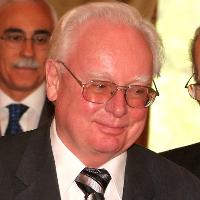Ludwig Finscher facts for kids
Quick facts for kids
Ludwig Finscher
|
|
|---|---|
 |
|
| Born | 14 March 1930 |
| Died | 30 June 2020 (aged 90) Wolfenbüttel, Lower Saxony, Germany
|
| Education | University of Göttingen |
| Occupation |
|
| Organization | |
| Awards |
|
Ludwig Finscher (born March 14, 1930 – died June 30, 2020) was a German expert in music. He was a musicologist, which means he studied music history and theory. He taught about music at the University of Heidelberg and helped create a huge encyclopedia about music. People all over the world looked up to him. He knew a lot about Western Classical music, from the 1500s up to modern times. He also looked at how music connects to culture, society, history, and even ideas about life. He wrote in a way that was easy for everyone to understand, not just other experts.
Contents
Who was Ludwig Finscher?
Ludwig Finscher was born in Kassel, Germany. He was the youngest of five children. He loved learning and studied many subjects at the University of Göttingen from 1949 to 1954. These subjects included music, English, German, and philosophy.
How did Ludwig Finscher become a music expert?
After his studies, Ludwig Finscher earned a special degree called a doctorate. His main project was about music pieces called masses and motets by a composer named Loyset Compère.
He worked for a short time at a German archive for folk songs. Then, he became a freelance writer and music critic. This means he wrote articles and reviews about music for newspapers and magazines. In 1960, he started working as a scientific assistant. He helped professors at different universities, including the University of Kiel and the University of Saarbrücken.
In 1967, he wrote an important work about the string quartet. This is a type of music played by four string instruments. His work focused on how Joseph Haydn helped create this style of music. After this, he became a professor of musicology. He taught at the University of Frankfurt from 1968 to 1981. Then, he moved to the University of Heidelberg, where he taught until he retired in 1995.
What else did Ludwig Finscher do?
Ludwig Finscher was also a leader in the world of music research. He was the president of the German Society for Music Research from 1974 to 1977. He also led the International Musicological Society from 1977 to 1981. This shows how respected he was by other music experts around the globe.
Ludwig Finscher passed away in Wolfenbüttel, Germany, on June 30, 2020. He was 90 years old.
What did Ludwig Finscher research?
One of Ludwig Finscher's biggest achievements was editing a new version of a huge music encyclopedia. It was called Die Musik in Geschichte und Gegenwart. This encyclopedia had 28 volumes! He started working on it in 1994. He wrote or updated about 40 articles for this massive project.
What were his main topics of study?
His detailed studies on string quartets, chamber music, and the composer Joseph Haydn are very important in musicology. People still use them as key resources today. He also wrote a two-volume book about music from the 15th and 16th centuries.
Finscher also helped create complete collections of music by famous composers like Christoph Willibald Gluck, W. A. Mozart, and Paul Hindemith. He published more than 130 articles in different books and journals. He always tried to use simple words so that both experts and people who just loved music could understand his ideas.
Awards and Recognition
Ludwig Finscher received many important awards for his work. These awards showed how much his contributions to musicology were valued.
- In 1994, he received the Pour le Mérite award. This is a very high honor in Germany for people who have done great things in arts and sciences.
- In 1997, he was given the Order of Merit of the Federal Republic of Germany. This is another important German award.
- In 2003, he received an honorary doctorate from the University of Zürich. This means the university recognized his achievements with a special degree.
- In 2006, he won the Balzan Prize. This is a major international award given to people who have made outstanding achievements in science and culture. The President of Italy gave him this award in Rome.
The Balzan Prize committee praised him for his wide-ranging research in music. They noted his "penetrating, memorable insights into great works of music." They also highlighted his deep comments on musical topics. They especially mentioned his work as editor of the new Die Musik in Geschichte und Gegenwart encyclopedia. This encyclopedia helped share the newest music research with many musicians and music lovers.
 | Chris Smalls |
 | Fred Hampton |
 | Ralph Abernathy |

